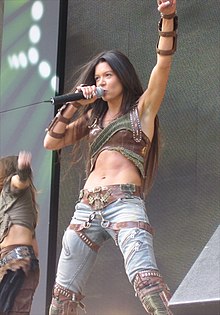| Revision as of 11:49, 18 December 2005 editIlya (talk | contribs)Extended confirmed users1,503 editsmNo edit summary← Previous edit | Revision as of 10:37, 20 December 2005 edit undoCommander Keane bot (talk | contribs)Extended confirmed users28,778 editsm Robot-assisted disambiguation (you can help!): EnglishNext edit → | ||
| Line 3: | Line 3: | ||
| '''Wild Dances''' ({{Lang-uk|Дикі танці|Dyki tantsi}}) is the name of the song (and the ])) by ] pop-star Ruslana Lyzhichko (]). Ruslana performed the song at the ] in ]. After qualifing from the semi-final, in which it had in fact been narrowly outscored by ]'s entry "Lane moje", the song turned the tables in the final, and the 280 points it received were sufficient to claim a famous Eurovision victory for ]. | '''Wild Dances''' ({{Lang-uk|Дикі танці|Dyki tantsi}}) is the name of the song (and the ])) by ] pop-star Ruslana Lyzhichko (]). Ruslana performed the song at the ] in ]. After qualifing from the semi-final, in which it had in fact been narrowly outscored by ]'s entry "Lane moje", the song turned the tables in the final, and the 280 points it received were sufficient to claim a famous Eurovision victory for ]. | ||
| With a mixture of ] and ] lyrics, "Dyki tantsi" had the distinction of becoming the first Eurovision winner to be sung at least partly in a language other than English since the rule-change of 1999, when countries were freed from the restriction of having to sing in one of their own official languages. | With a mixture of ] and ] lyrics, "Dyki tantsi" had the distinction of becoming the first Eurovision winner to be sung at least partly in a language other than English since the rule-change of 1999, when countries were freed from the restriction of having to sing in one of their own official languages. | ||
| The song was remembered for an energetic performance, which Ruslana gave in a leather outfit, inspired by ethnic tradition of Ukraine. | The song was remembered for an energetic performance, which Ruslana gave in a leather outfit, inspired by ethnic tradition of Ukraine. | ||
Revision as of 10:37, 20 December 2005

Wild Dances (Template:Lang-uk) is the name of the song (and the album)) by Ukrainian pop-star Ruslana Lyzhichko (Ruslana). Ruslana performed the song at the Eurovision Song Contest 2004 in Turkey. After qualifing from the semi-final, in which it had in fact been narrowly outscored by Serbia and Montenegro's entry "Lane moje", the song turned the tables in the final, and the 280 points it received were sufficient to claim a famous Eurovision victory for Ukraine.
With a mixture of English and Ukrainian lyrics, "Dyki tantsi" had the distinction of becoming the first Eurovision winner to be sung at least partly in a language other than English since the rule-change of 1999, when countries were freed from the restriction of having to sing in one of their own official languages.
The song was remembered for an energetic performance, which Ruslana gave in a leather outfit, inspired by ethnic tradition of Ukraine.
Categories: